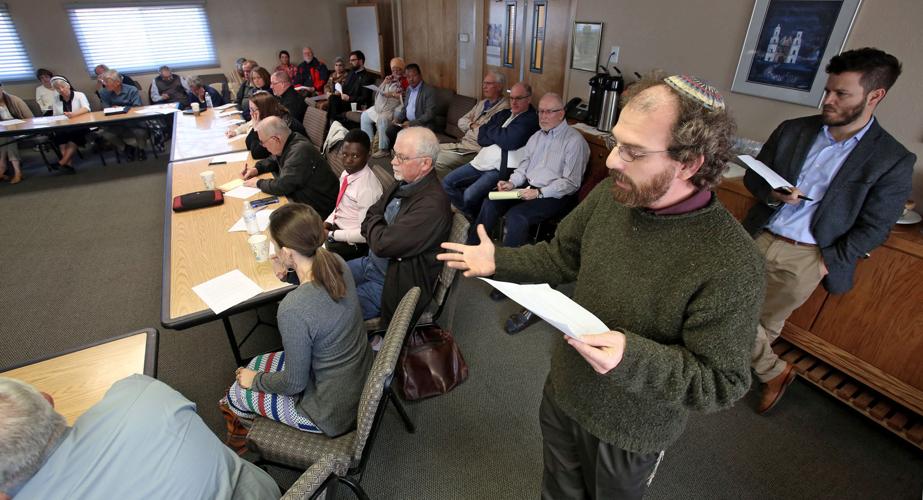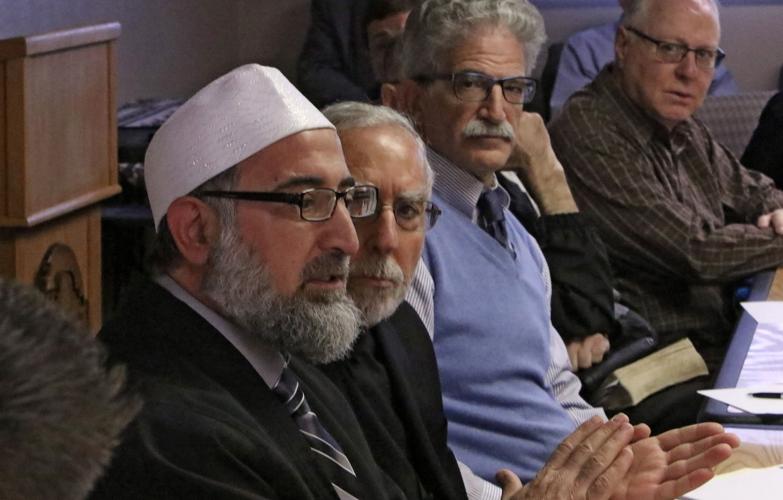More than 60 Southern Arizona religious leaders gathered Tuesday morning to express their opposition to recent presidential orders banning the admission of refugees and calling for the construction of a border wall.
Bishop Gerald Kicanas of the Roman Catholic Diocese of Tucson led the meeting, spurred by a conversation he had previously with Rabbi Thomas Louchheim of Congregation Or Chadash.
“I think there was a growing sense of concern among religious leaders regarding their congregations and the divisions that exist within congregations,” Kicanas said. “And how could we, as leaders of this faith community, bring an initiative to try and urge respectful dialogue and affirm our moral teachings as people of faith to welcome the stranger and foster peace?”
Christian, Muslim, Jewish and Sikh leaders were joined by representatives from other faith organizations that work with immigrants and refugees. About 40 religious organizations were represented.
The public statement drafted during Tuesday’s gathering affirmed the commitment of the represented religious communities to welcome, support and defend Southern Arizona’s community of immigrants and refugees.
The statement was signed by 105 leaders from 57 congregations and religious organizations and will be sent to members of Arizona’s congressional delegation and the president. It asks that President Trump rescind the executive orders targeting these communities and develop immigration policies consistent with “the values and moral fabric of our nation.”
“If there is anything scripture is clear on across traditions, it is to welcome strangers and extend hospitality,” said the Rev. Robert Hendrickson III of St. Philip’s in the Hills Episcopal Church. “I think right now we are watching forces segment parts of the community, and it pits us against each other. ... The statement that came out is that simple proclamation that we are one community, and the faith community will respect human dignity.”
The leaders at the meeting also acknowledged the diversity of opinions within their own congregations.
“When there is polarization, the only way through is to engage in respectful dialogue,” Kicanas said after the meeting. “I think it was a clear commitment on the part of religious leaders here to try and work with people in our congregations of varied perspectives to see if we could reach some level of common ground and understanding among us.”
The religious leaders’ statement strongly opposes the related executive orders and states clearly that the signing members stand beside immigrants, refugees and Muslims impacted by these actions.
“We have some brothers and sisters, they are afraid of what President Trump announced,” said Imam Watheq Alobaidi of the Muslim Community Center of Tucson. “We need to make these people not be afraid because we feel that we are citizens in this country and, yes, we are part of this community.”
Alobaidi plans to share with his congregation the support shown Tuesday morning.
“This was very encouraging, and Tucson has always been a gracious community,” said Maqsood Ahmad, a director of the Muslim Community Center of Tucson.
The mosque community feels the impact of the ban directly, including among Syrian refugee families who are “absolutely devastated,” Ahmad said.
Alobaidi himself is a refugee from Iraq. He has lived in the United States since 2009 and is now an American citizen, along with his wife and two daughters. The three women have planned a trip to Turkey to visit family in February. Now they’re not sure if they should go for fear they won’t be able to get back to Tucson.
“We need to let the Muslim community know they are cared about; they are part of the community,” Rabbi Louchheim said at the meeting. “They are welcomed, not foreigners or strangers, but neighbors. It’s incumbent on us to reach out to them.”
The group grappled with overcoming fear and building relationships.
“While all religious leaders understand the need to protect our borders and make sure our country is safe, we shouldn’t be driven by fear,” Kicanas said. “We should be driven by our moral values, and that’s what we were trying to do.”





